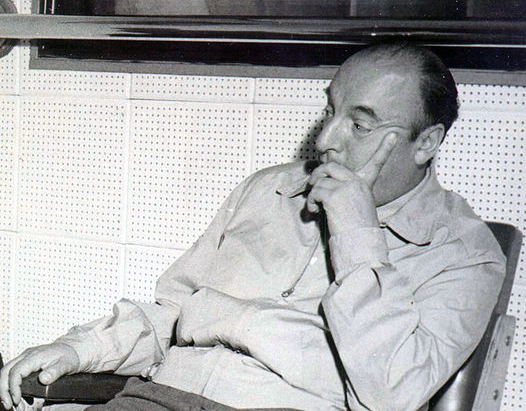The Art of Poetry No. 14
“My house has been burned; I have been detained more than once; I have been exiled; they have declared me incommunicado . . . Very well then. I'm not comfortable with what I have.”

Pablo Neruda, born Neftalí Ricardo Reyes Basoalto on July 12, 1904, in Parral, Chile, is regarded as one of Latin America’s most significant poets. The winner of the 1971 Nobel Prize in Literature, Neruda was raised in a working-class household and spent many of his formative years in the town of Temuco, where Gabriela Mistral (the head of a local secondary girls’ school who would herself win the Nobel Prize in Literature in 1945) befriended the young poet and encouraged his writing. His second book of poetry, Twenty Love Poems and a Song of Despair, was published in 1924 and was an instant success. From 1927 to 1935, he represented Chile in a series of honorary consulships in Burma, Ceylon, Java, Singapore, Buenos Aires, Barcelona, and Madrid and continued to publish collections of poetry, including 1933’s Surrealism-influenced Residence on Earth. Leftist politics figured prominently in his work; in 1970 he even ran for the presidency of Chile as the Chilean Communist Party candidate; “Political poetry,” he told The Paris Review in his 1971 Art of Poetry interview, “is more profoundly emotional than any other.” Soon after receiving the Nobel Prize in 1971, Neruda died, ostensibly from cancer; in recent years, though, there has been conjecture that his death was potentially tied to a politically motivated poisoning.
Photo via Wikimedia Commons
“My house has been burned; I have been detained more than once; I have been exiled; they have declared me incommunicado . . . Very well then. I'm not comfortable with what I have.”
On the sand
a
lizard
In the half-sun of long days
let us draw our tired bones together
let us forget the unfaithful ones
I was fourteen years old,
brooding, a proud of it,
slim, lithe and frowning,
Now this is it, said Death,
and as far as I could see
Death was looking at me.
A man says yes without knowing
how to decide even what the question is,
and is caught up, and then is carried along
I went into the tool shops
in all innocence
to buy a simple hammer
Why such harsh machinery?
Why, to write down the stuff
and people of every day,
Then I arrived at the capital, vaguely saturated
with fog and rain. What streets were those?
The garments of 1921 were breeding
I keep a blue bottle.
Inside it an ear and a portrait.
When the night dominates